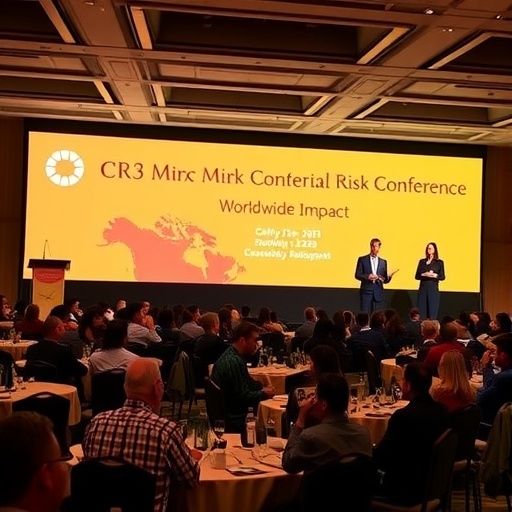The 2025 MRS International Risk Conference recently convened in Boston from July 24 to 26, bringing together a diverse array of academics and practitioners focused on the evolving landscape of risk management and financial innovation. This landmark event, co-organized by China Finance Review International (CFRI), Suffolk University’s Sawyer Business School, and the Modern Risk Society (MRS), underscored the critical role of interdisciplinary research in confronting the multidimensional challenges posed by contemporary financial systems. Over the course of three days, the conference served as a crucible for pioneering ideas that merge quantitative rigor with practical insights in risk governance.
In an era marked by rapid technological advancement and environmental uncertainty, the conference received an impressive 443 paper submissions from 37 countries spanning five continents. After a meticulous peer-review and selection process, 180 scholarly works were incorporated into the program. The geographic diversity of the contributions highlighted the global nature of financial risk research, with East Asian scholars accounting for nearly half of the submissions, followed by significant participation from North America and Europe. This composition reflected the interconnectedness of academic communities and the shared urgency to address systemic vulnerabilities in global markets.
A central theme among the presentations was the interplay between artificial intelligence (AI) and risk management. Scholars dissected the multifaceted risks posed by accelerated automation, algorithmic opacity, and data monopolization. Discussions delved into how unchecked AI applications can exacerbate systemic fragility, potentially undermining financial stability while offering new avenues for innovation. The conference elevated discourse around responsible AI deployment, emphasizing the necessity of transparent governance frameworks that balance technological progress with ethical considerations.
Climate risk emerged as another pivotal topic, approached through a cross-disciplinary lens that blends environmental science, economics, and financial modeling. Researchers showcased sophisticated methodologies for quantifying climate-related exposures and integrating these metrics into asset pricing and portfolio management. The growing urgency of climate change calls for adaptive strategies capable of mitigating transitional and physical risks, thereby fostering resilient capital markets that support sustainable development goals. Presenters highlighted innovative financial instruments designed to mobilize green investment and facilitate carbon risk disclosure.
The integration of AI with climate risk assessment was further explored in specialized sessions co-hosted with the MIT Environmental Solutions Initiative. Here, leading experts outlined computational techniques that enhance predictive accuracy for climate hazards, incorporating machine learning algorithms that can analyze vast datasets related to weather patterns, emissions trajectories, and socioeconomic impacts. The fusion of AI and climate science promises to revolutionize the way financial institutions evaluate environmental risks and adjust their risk appetite accordingly, advocating for systemic reforms in regulatory policies.
One of the conference’s keynote speakers, Professor Daron Acemoglu from MIT and the 2024 Nobel laureate in Economics, delivered a compelling address titled “Reclaiming Humanity in the Age of AI.” He cautioned against the hazards of over-automation and homogenization of information, proposing five institutional interventions intended to transform AI into a tool that complements rather than replaces human judgment. His recommendations encompassed progressive taxation, clear establishment of data property rights, increased public funding for research and development, enhancement of algorithmic transparency, and innovative labor co-governance models, each aimed at preserving social welfare in an AI-driven economy.
Following this, Professor Peter Tufano from Harvard Business School presented a keynote on “AI and Climate Risk,” which synthesized insights from environmental sciences, computational technologies, and finance. His presentation illuminated actionable pathways for embedding sustainability principles within capital markets by leveraging AI to discern climate risk signals and inform investment decisions. The strategic emphasis on sustainable finance and technology-enabled risk analytics mirrors the emergent trend of environmental, social, and governance (ESG) integration into mainstream financial practices.
The conference also celebrated extraordinary academic accomplishments through the Research Excellence Awards and the Distinguished MRS Scholar lifetime achievement accolade. These honors, sponsored jointly by CFRI and partners including the Pacific-Basin Finance Journal, the Rosenberg Institute for East Asian Studies, and the Global Association of Risk Professionals, recognized scholars who have significantly advanced the fields of risk and finance. Among the recipients were researchers from leading institutions worldwide, whose works contribute critical empirical and theoretical advancements in understanding systemic risk, financial regulation, and innovative market mechanisms.
During the event, the CFRI 2025 Editorial Board convened its annual meeting, attracting participation from 15 global board members. Executive Editor Professor Wenfeng Wu articulated the journal’s strategic priorities, including improving manuscript review efficiency, expanding international collaborations, and enhancing the journal’s academic visibility. The board’s deliberations underscored the importance of fostering a dynamic platform that bridges Eastern and Western scholarly traditions, thereby enriching global discourse on financial risk management.
The conference culminated with a forward-looking dialogue emphasizing the imperative of integrating academic research with industry practice to forge robust solutions for global financial risk governance. Professor Wenfeng Wu stressed that the confluence of AI and climate challenges necessitates unprecedented collaboration across disciplines and sectors. Building on the achievements of the 2025 gathering, CFRI commits to championing interdisciplinary innovation under the banner of “Transformation and Innovation in Global Financial Markets,” aspiring to influence policymaking and catalyze transformative change.
The 2025 MRS International Risk Conference reaffirmed its position as a premier forum for advancing critical scholarship on risk and finance, highlighting the nexus of technology, sustainability, and global finance. Its success in attracting a broad and promising pool of researchers signals growing momentum toward addressing complex global risks with sophistication and urgency. As the financial world grapples with unprecedented uncertainties, such intellectual endeavors are vital to lay the groundwork for more resilient and equitable economic systems.
Subject of Research: Global financial risk governance, AI risk, climate risk, green finance, systemic risk, and cryptocurrency regulation.
Article Title: 2025 MRS International Risk Conference Unites Global Scholars to Tackle AI and Climate Challenges in Finance
News Publication Date: July 2025
Web References:
Image Credits: Qianyi Qin.
Keywords: Risk management, artificial intelligence risk, climate risk, green finance, systemic risk, financial regulation, interdisciplinary collaboration, sustainable finance, algorithmic transparency, financial innovation, global financial markets, academic conference




